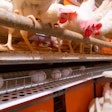
Feeding certain trace minerals to breeder birds can benefit their progeny, according to recent research.
In a WATT Poultry Chat interview, Dr. Mercedes Vázquez-Añón, senior director of strategic initiatives and account collaboration for Novus International Inc., spoke about a new publication on breeder nutrition. Along with looking at management, genetics and epigenetics the book investigates maternal nutrition.
Austin Alonzo: Let's talk nutrition. What impact does maternal nutrition have on progeny development?
Mercedes Vázquez-Añón: This is an area that we've been working on for a couple of years. Breeders have been a topic of interest to us for several years, where we were finding that trace mineral nutrition improved the productivity of the breeder in many different ways. Structural health, reproduction, and also hatchability. What we've been focusing on in the last couple of years has been the effect of the feeding of the breeder that will have on the next generation in the offspring. And we found that feeding that bis-chelated trace minerals, we were seeing improvements in the offspring, especially in the immune development of the immune system, and also muscle development. This is in comparison with inorganic trace minerals. So these results were somewhat exciting, and we continue to work. It led us to really neat collaborations with universities, but also with breeder companies. This led to some more work, and that led to the development of our chapter on this topic.
Austin Alonzo: So you mentioned the book, I know that Novus just released one called Breeder Management and Nutrition: Moving the industry forward. As you said, you authored one of the chapters on maternal feeding, can you tell us more about it?
Mercedes Vázquez-Añón: So this is a book that we're very excited about. And it covers management, nutrition, epigenetics, and genetics. We've been very lucky that in this book, we can also include the area of epigenetics, which is really the effect of the nutrition of the mother, the breeder on the offspring. We have actually three chapters dedicated to this topic.
Some of the authors of this are people that are experts in this field. Examples of that is Dr. Rebecca Forder from Australia. And she wrote about the management and the programming maternal programming in the offspring. We also have other authors. From the (KU Leuven) University in Belgium, Dr. Johan Buyse, and he talks about the strategies in different multiple generations, feeding strategies that will improve the offspring. And in our case, at Novus we were lucky that we also have a chapter with Dr. (Juxing) Chen and myself in relation to the development of the immune system of muscle development when we feed, bis-chelated trace minerals to the breeder. So we're very excited that this is coming up to be a very complete book. And that covers this exciting area of epigenetics and co-maternal programming.
Austin Alonzo: Was there anything else you'd like to add?
Mercedes Vázquez-Añón: I would like to invite everybody to an event where we've released this book, and it is the week of October 17. You can sign up for it at novusint.com where the authors of the different chapters will speak. We have as many as 14 chapters, but I think we will have 11 speakers where they will provide an insight to their chapters and their findings. So, hopefully you can join us at this event.
This transcript edited for length and clarity.

















